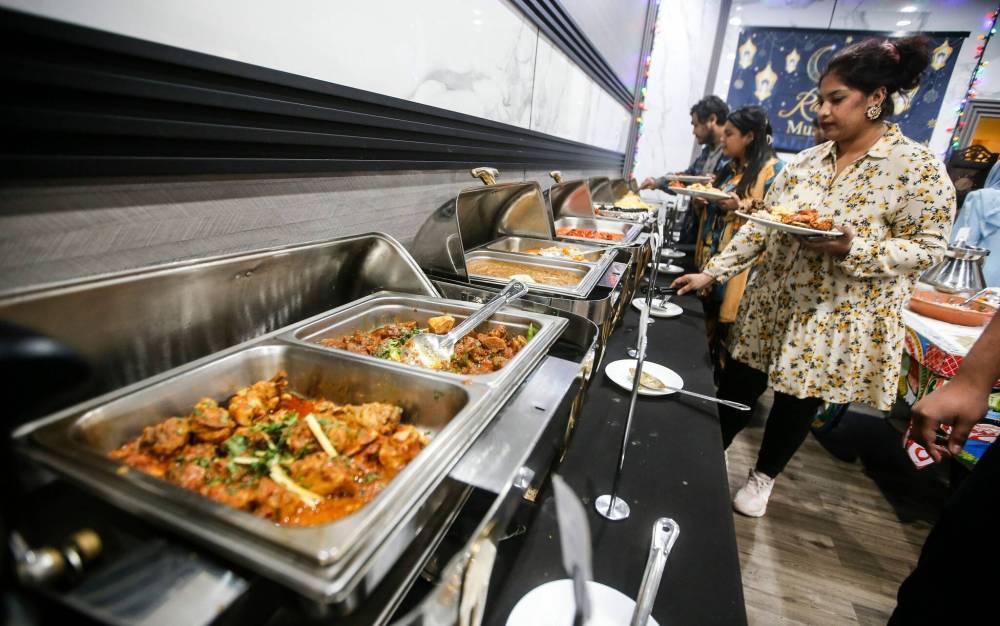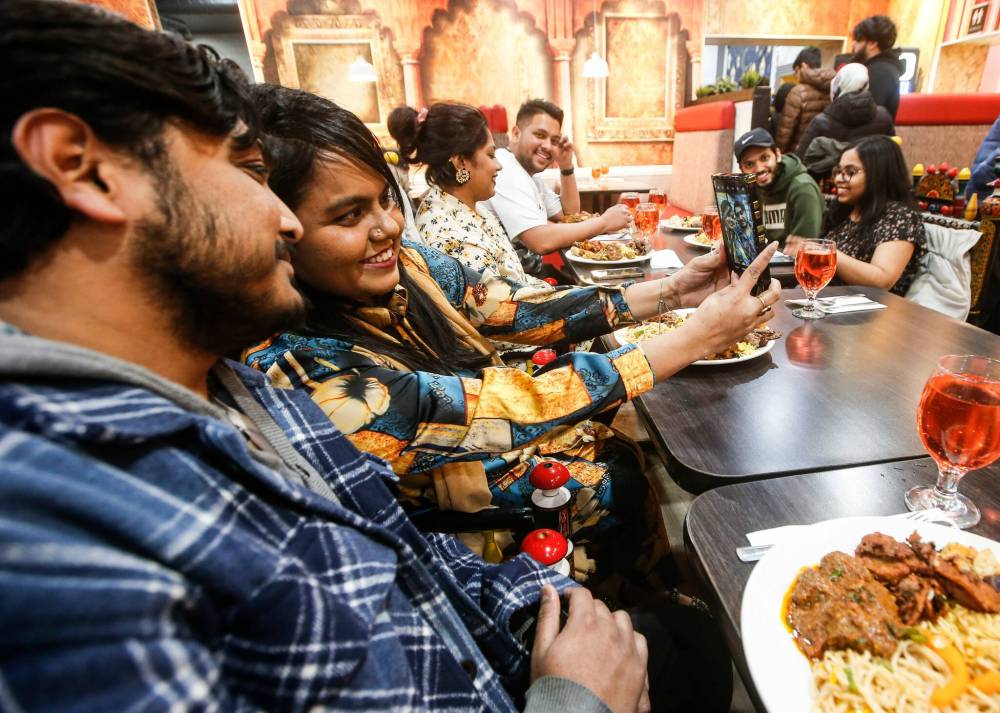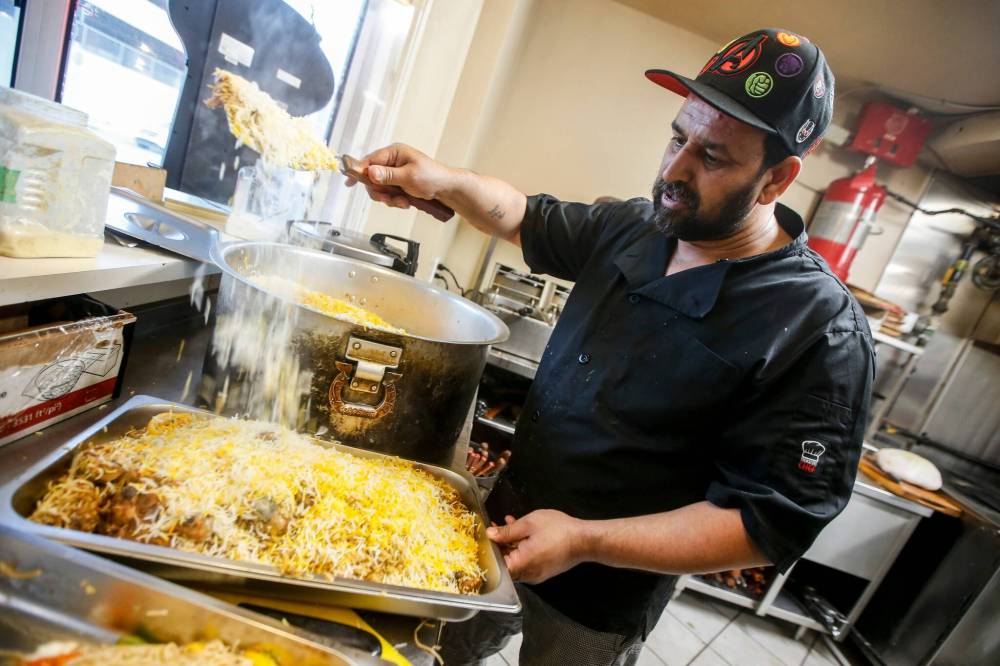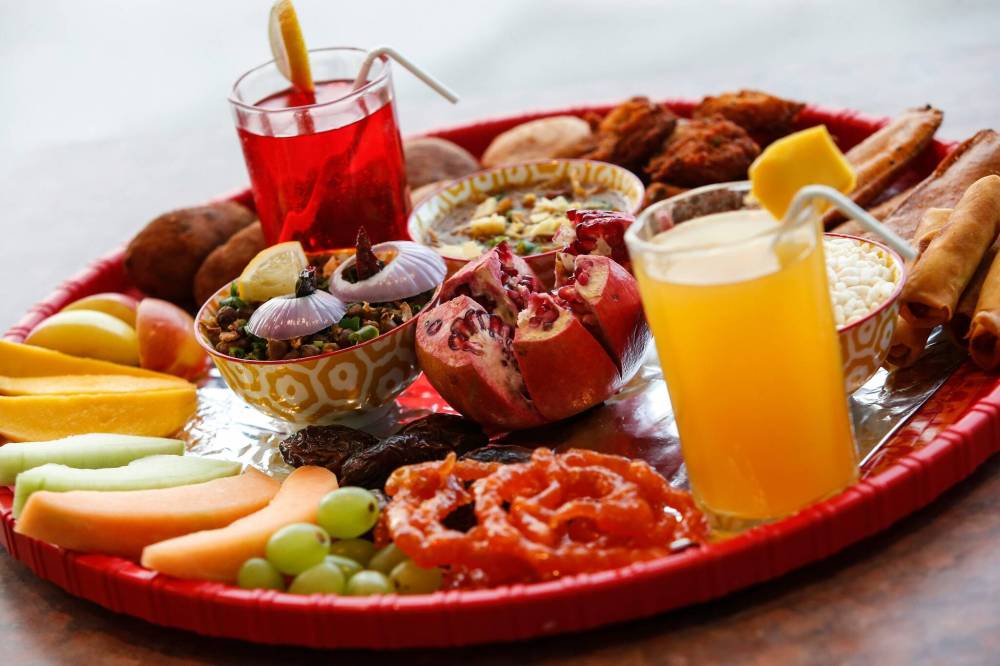Fast, then feast Muslim restaurants offer special dishes for iftar during Ramadan
Read this article for free:
or
Already have an account? Log in here »
To continue reading, please subscribe:
Monthly Digital Subscription
$19 $0 for the first 4 weeks*
- Enjoy unlimited reading on winnipegfreepress.com
- Read the E-Edition, our digital replica newspaper
- Access News Break, our award-winning app
- Play interactive puzzles
*No charge for 4 weeks then billed as $19 every four weeks (new subscribers and qualified returning subscribers only). Cancel anytime.
Read unlimited articles for free today:
or
Already have an account? Log in here »
At Barbeque Hut Pakistani Grill, chefs have been busy all day preparing the restaurant’s Grand Iftar Buffet.
In the Notre Dame Avenue dining room, warming trays stand in a row, filled to the brim with meat dishes, rice, breads, salads and fritters.
There is low thrumming buzz, a controlled hustle from the kitchen to the dining room as servers walk swiftly to the yet-to-be-filled trays, decanting more food into the receptacles.

JOHN WOODS / FREE PRESS
People dig in at an iftar buffet at the Barbecue Hut.
On the surface it looks like any other restaurant buffet, except that here no one is lining up for food or eating yet.
Instead diners will wait patiently for the clock to strike exactly 7:55 p.m. before they collectively break their fast.
Only then can they take part in the iftar, or breaking fast, feast.
The ninth month of the Islamic calendar, Ramadan is significant for the Muslim community, as they believe this was the month the first verses of the Qur’an were revealed to the Prophet Muhammad.
The month begins with the sighting of a crescent moon, and for the following 30 days practising Muslims will abstain from food and drink during daylight hours.
Fasting is obligatory for observant Muslims, although there are exemptions for the very old, the very young and those who are ill, pregnant, nursing, menstruating or travelling.
Believers have been fasting for 17 days. There are another 13 days of abstinence, from dawn to dusk, left before Ramadan ends.
In the kitchen Jehengir Khan, chef and owner, expertly manoeuvres skewers of beef over an open fire.
Khan’s freshly grilled kebabs are the restaurant’s specialty and the scent of flame-licked meat fills the air.
It would be tempting indeed for Khan to taste for seasonings but he, like his diners, is also fasting this month.
Khan and his staff of 12 serve up to 20 different dishes for the $29.99 Grand Iftar Buffet, which runs from 7:30 p.m. to 9 p.m. on weeknights.

JOHN WOODS / FREE PRESS
Fariha Peu and Zafrul Hasan Shuvo, with their family and friends, take a photo of themselves at an iftar buffet at the Barbecue Hut.
On Fridays, Saturdays and Sundays, there is the $35 Royal Iftar Buffet, with more than 25 dishes for diners looking to break their fast.
Ramadan is especially busy at the restaurant, which also runs its usual menu alongside the iftar special. Khan and his staff work non-stop preparing their usual fare of mixed grills, rotis, pulaos and wraps alongside the buffet dishes.
It’s a lot of food to prepare, especially if you yourself are fasting. Is it tough to spend the day cooking without being able to taste anything?
“Honestly, I am used to it — it’s tradition, it’s a religious practice,” Khan says.
“I really enjoy Ramadan. Fasting is one of five pillars of Islam. I have been fasting from seven years old, so I have been doing for around 42 years. It’s regular practice for me.”
Khan last ate at around 5 a.m. Sahoor, the meal before fasting proper begins, must take place before sunrise.
He and his family shared a simple breakfast of paratha, scrambled eggs, water and tea to set themselves up for the day.
He will break his fast after the diners are fed.
Just before iftar, Khan turns on his phone speaker, which plays out the Adhan, the Islamic call to prayer, signalling the end of that day’s abstinence.
“Because we are so busy, my staff and I will break our fast with a date and some water. We will continue working until our guests start to eat, then we will also sit down in the dining room and we will all eat together,” he explains.
“It is a very good experience; there is nothing like it.”

JOHN WOODS / FREE PRESS
Jehangir Khan, owner of the Barbecue Hut, prepares Chicken Biryani for an iftar buffet.
Barbeque Hut is one of the few Winnipeg restaurants serving a special iftar menu to the city’s 25,000-strong Muslim community.
At Aladin’s Pizzeria and Shawarma Place on Portage Avenue, customers reserve the restaurant’s $19.99 iftar deal, which comes with six starters, two mains, a dessert and two drinks.
“It’s a very popular deal. We have customers all the time during breaking fast, coming in to order for take-away or they also dine in. Some customers order online and pick up before it’s time to break fast,” says Ramin, a staff member.
The starters include fritters, fruit and chickpeas, while the mains offer a choice of goat or beef biryani served with tandoori chicken leg.
Staff at the restaurant break fast at the same time as everyone else, Ramin says.
Once everyone has eaten, it’s back to work, as the place also runs its usual pizza and pasta dishes for those seeking more familiar fare.
A similar scene unfolds at Al-Basha on Pembina Highway. The restaurant, which specializes in Middle Eastern cuisine, has an extensive all-day menu of cold and hot mezze, wraps, poutines, burgers and desserts.
During Ramadan, the restaurant offers seven sets of iftar specials priced at $29.99 per person, with one for each day of the week.
The specials, served from sundown until closing (midnight), are:
- Mondays, Egyptian Molokai stew with rice and chicken;
- Tuesdays, Syrian Bamya, an okra and beef stew served with rice;
- Wednesdays, Palestinian Makloba, which is a “upside down” Palestinian chicken with eggplant, cauliflower and rice;
- Thursdays, Ozie rice from Syria with peas, beef and lamb stew wrapped in a filo pastry and served with yoghurt and cucumber;
- Fridays, slow-cooked Middle Eastern chicken biryani;
- Saturdays, Jordanian Mansaf, which is lamb served with yellow rice and fermented yoghurt; and
- Sunday, Palestinian Mousakan — multiple layers of bread, sumac, olive oil, onions and chicken.
Each main dish comes with a special Ramadan drink, dates, soup of the day, samosa, dessert and tea.
Elsewhere on Pembina, Curry King’s owner Mohammed Aktaruzzaman is busy preparing the restaurant’s iftar platter, composed of 12 different items.

JOHN WOODS / FREE PRESS
An iftar platter at the Curry King
“We serve Bangladeshi-style iftar in our restaurant,” Aktaruzzaman explains. “Our $14.99 platter has piyaju (pakora); cholla vuna (chickpeas cooked with spices); beguni (eggplant fritters); potato chop (meat and potato croquettes); egg chop (egg and potato croquettes); spring rolls; jilapi (deep-fried pastry soaked in sugar syrup); dates; fruit; puffed rice; halim (a stew made with lentils, wheat and meat); and juice. There is also a platter with chicken biryani that costs $15.99.”
Aktaruzzaman has been serving his iftar platters since 2019 and they are popular with his customers who often order in advance, he says. Each platter is meant to serve one person, but he also offers a grand platter with enough food to serve five.
Throughout the day Aktaruzzaman and his team of three, who are also fasting, make all the food from scratch. People start streaming in at around 6 p.m., on their way home from work, to pick up their iftar platters.
A few customers will dine in the 16-seat space, but the majority tend to take their meals home.
For Aktaruzzaman, Ramadan is a special month — it reminds him of what Islam is all about.
“Ramadan teaches us to be compassionate towards those who don’t have food or water. It teaches us to practise kindness and patience, not to do bad things like lie or cheat. It reminds us to give to charity and keeps us close to God,” he says.
The month-long fast comes to an end when Muslims once again lift their eyes towards the skies. When the crescent moon is in sight, the month of Shawwal begins and Eid-ul-Fitr, the celebration to mark the end of the fasting period, commences.
av.kitching@winnipegfreepress.com

History
Updated on Wednesday, March 27, 2024 11:37 AM CDT: Removes unneeded word

